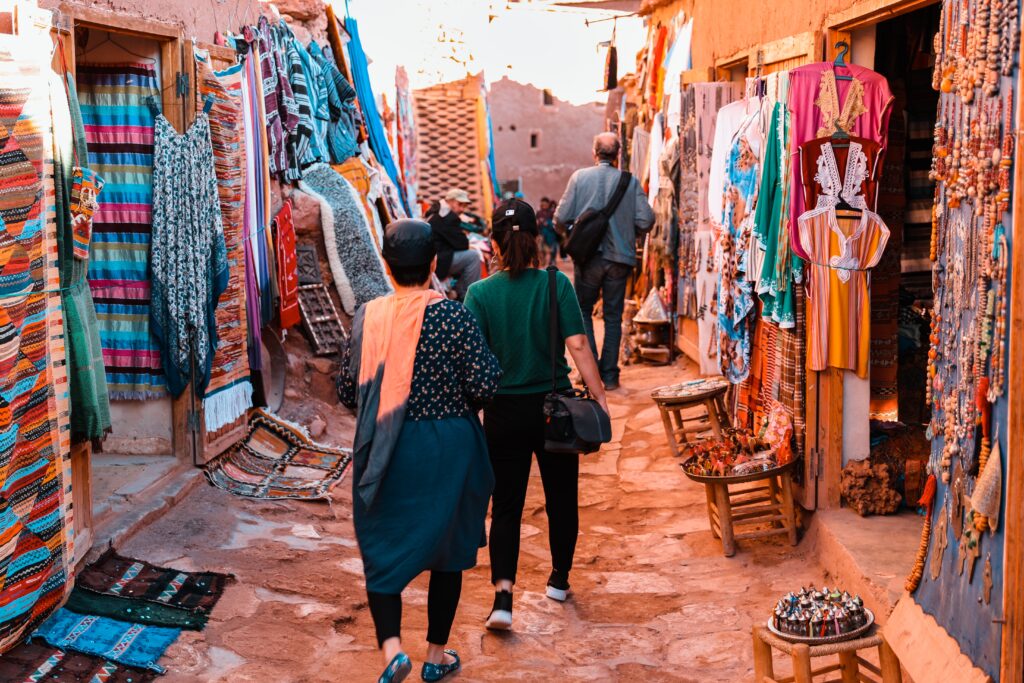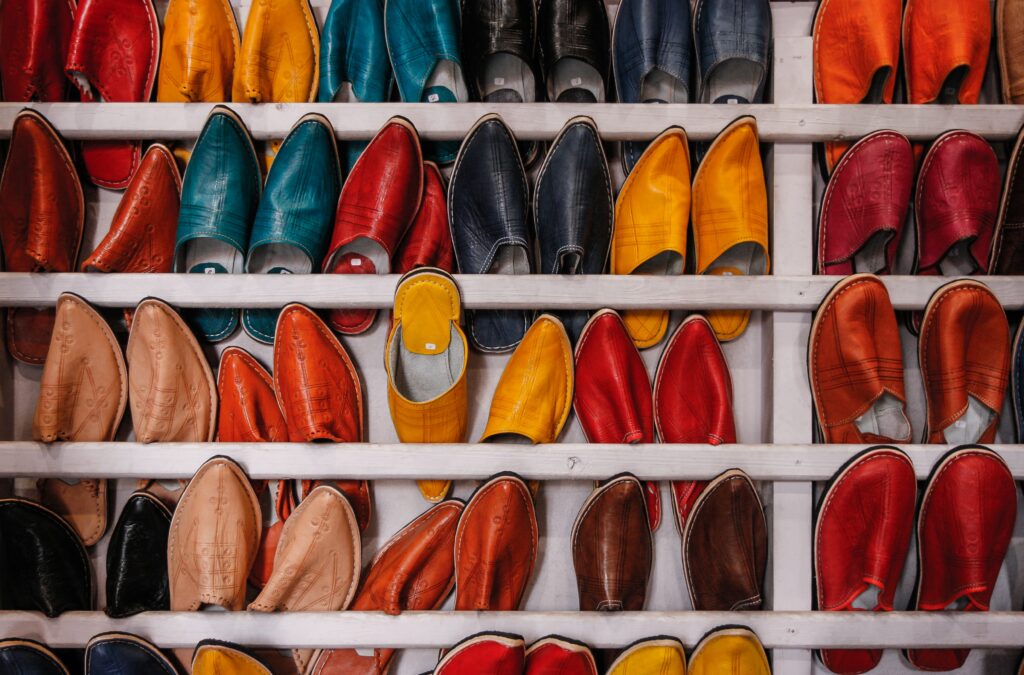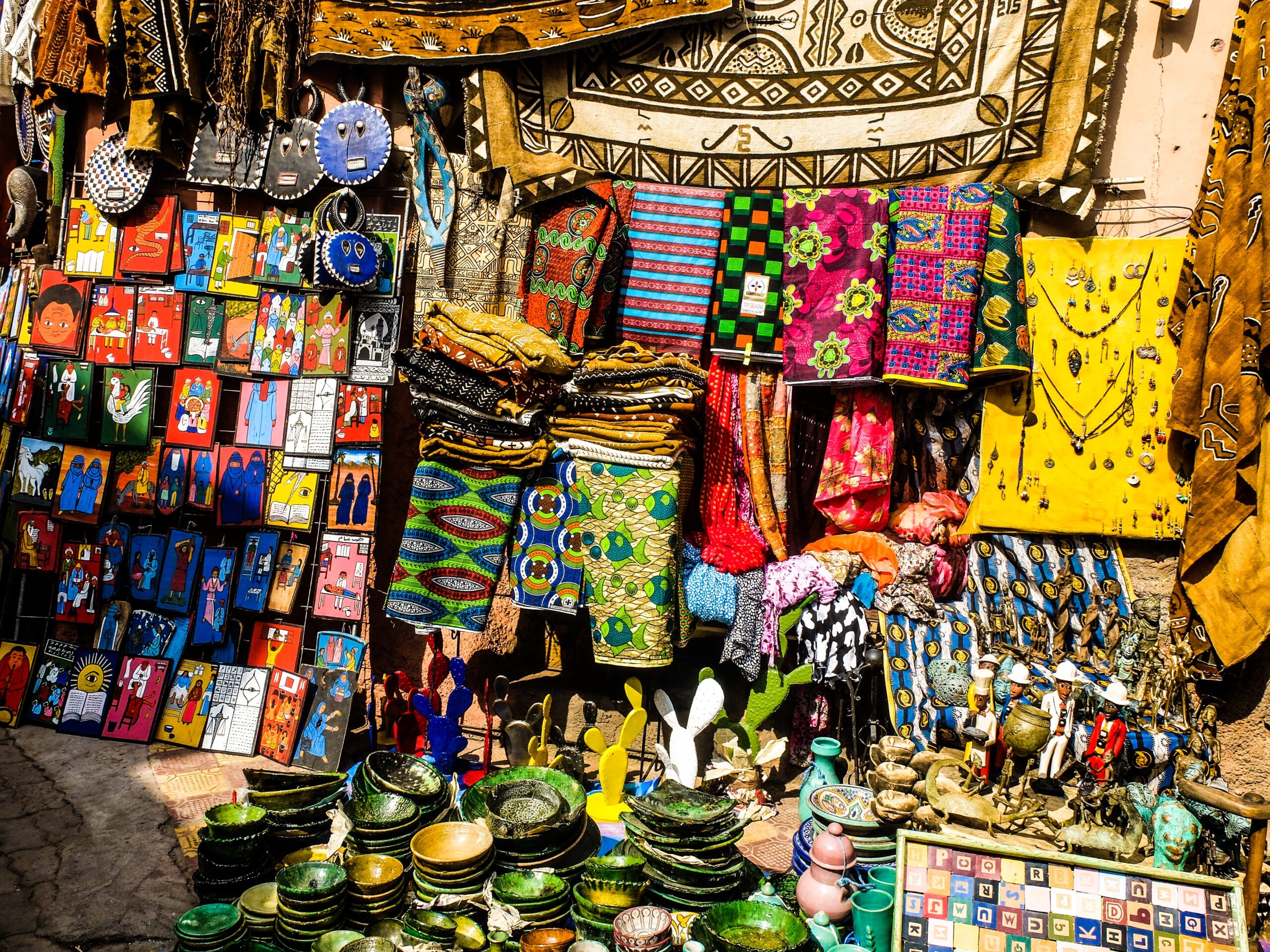Experience the vibrant and exotic world of shopping in Morocco, where centuries-old traditions meet modern marketplaces. Morocco is a shopper’s dream, with a kaleidoscope of colors, textures, and flavors to satisfy your senses. Explore busy souks in places such as Marrakesh, Fes, and Casablanca, where labyrinthine lanes are teeming with hidden treasures. From delicate handmade carpets and pottery to fragrant spices and ornate lanterns, you’ll find a diverse range of one-of-a-kind and authentic products. To get the greatest deals and immerse yourself in the Moroccan shopping experience, don’t forget to haggle with friendly vendors.
Every Moroccan village has a weekly souk. Souks are lively, vibrant areas where agricultural food and artisan items brought by country people are sold alongside a variety of other basic everyday items. They last a few hours.
Souks can be found in large cities. These take place in the medinas and are organized according to the sort of commodities sold. Traders are kind and eager to delight their consumers. Moroccan crafts are available at the country’s souks and markets, as well as cooperative craft outlets and specialised shops, and are also sold by the roadside along tourist routes.
Markets
Every major city has multiple markets that sell fresh fruits and vegetables every day of the year. Every market has a fresh herb stall as well as a spice and olive stall. Household utensils, basketry, and craft items are also available for purchase.
The fruits of the daily catch, such as sole, sardines, perch, shrimp, squid, and oysters, can be consumed on the spot in the harbours along the Atlantic coast, particularly in the cities of Oualidia, Safi, Essaouira, and Agadir.
Souks
Souks are vivid and realistic expressions of rural life in Morocco for foreign visitors, providing an opportunity to witness a fascinating and genuine element of the country. Souks, which take place once a week, are the center of economic, social, and administrative activity in Morocco’s rural districts. People travel long distances to stock up on supplies or to trade agricultural produce (such as fruit, vegetables, eggs, butter, and grains) or craft items (such as ceramics and carpets) for tea, oil, sugar, and spices. Plastic utensils and synthetic clothing are also available, as are chickens, sheep, and occasionally mules.
Souks are held virtually every day in the medinas of Rabat, Fès, Marrakesh, and Taroudannt. The nature of what they offer dictates its location and layout. They are more tourist-oriented than the country souks and offer a wide variety of Moroccan handmade items. Fassi glazed pottery is not identical to those created in Salé or Safi, and it differs from Rif Berber pottery or Tamegroute pottery. Essaouira is known for its Thuya wood, Tazenakht for its Ouaouzguite carpets, and Kelaat Magouna for its daggers.

Food Stores
Grocery stores can be found in almost every community. Apart from the weekly souk, the grocer’s is the only site in villages where people can buy groceries and necessities.
These stores are typically the size of a huge cabinet. They have shelves from floor to ceiling and sell a variety of meals and home supplies. It is best to avoid purchasing perishable foods like yoghurt and milk because there is no guarantee that they will be fresh. What is available in butcher shops is neither labeled nor priced. Fruit and vegetable stores, dairies, and bakeries are only found in major cities. Despite the introduction of French bread under the Protectorate, Moroccans prefer kesra, a circular loaf cooked at home or in a bakery.
A few charcuteries offering cooked meats have opened in Casablanca, Rabat, and Marrakesh, but they cater solely to Western customers, as pork is forbidden to Muslims. You may check the sell-by dates of fresh goods at your local store (when they are marked, that is). Imported foods are also available in supermarkets.
Morocco saw the establishment of hypermarket chains few years ago. Marjane has locations in Casablanca, Rabat, Marrakesh, and Agadir.
Opening Hours
Country souks are only held in the morning. Grocery stores, local supermarkets, and butcher shops are open from 8 a.m. to 9 p.m. every weekday, albeit they close for roughly two hours in the middle of the day. Some may also be open on Sundays, with varied hours. Friday is a day of rest for Muslims, yet business continues as usual, with some major stores closing in the middle of the day. During Ramadan, grocers’ shops open late in the morning, close for part of the day, and then reopen late in the evening till late at night. Jewish-owned businesses are closed on Saturdays (the Sabbath).
Clothes and fabric stores are open from 9 a.m. to noon and from 3 p.m. to 7 p.m. in major cities. They are closed on Sundays. The hypermarkets that have sprouted up in certain major cities are open seven days a week from 9 a.m. to 9 p.m.
How To Bargain
Bargaining is an obligation rather than a custom in Morocco. Even when buying veggies in the souk or hiring a hotel room, every self-respecting Moroccan employs this strategy. Prices in artisan shops are not marked, and the shopkeeper believes it is normal for potential customers to haggle over the price. When a potential customer expresses an interest, the shopkeeper will quote an initial price that often has no relation to the true price of the thing in question but is intended to test the buyer’s readiness to make a counter-offer.
It is A bellows merchant in Marrakesh’s souk to effectively bargain. A brassware and copperware business in Casablanca’s Quartier Habbous. It’s crucial to know the value of what you want to buy or, at the at least, have a price limit in mind. In contrast, if you refuse to raise your offer sufficiently to allow the seller to benefit, the transaction will be abandoned. The true goal of negotiating is to obtain the desired object while pretending to be uninterested. This is why bargaining takes time and should be a delicate game played by both buyer and seller.

Methods Of Payment
Credit cards are only accepted in large towns and cities, as well as in modern stores. If you pick this method of payment, certain merchants will automatically add a percentage as tax to the total. Credit card slips may also be pre-dated or printed twice without your knowledge. It is therefore important to have adequate cash on hand before embarking on a buying spree.


